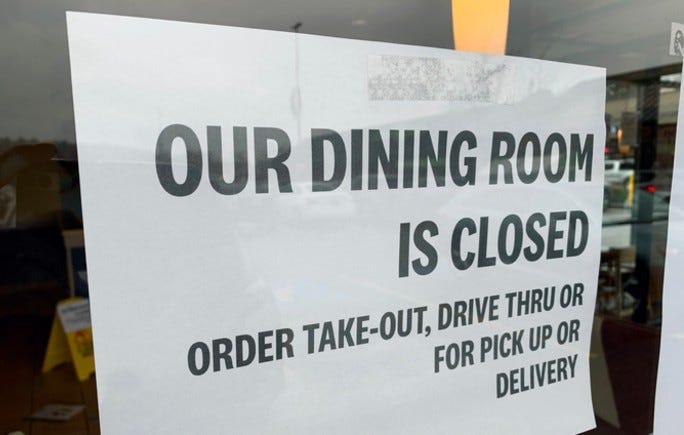
(WWJ) While some have lost their liquor licenses or faced fines, Michigan officials say most restaurants and bars have been following the rules.
Gov. Gretchen Whitmer, Attorney General Dana Nessel and other state officials on Monday issued statements highly commending bar and restaurant owners for their ongoing compliance with the state’s emergency health orders due to the COVID-19 pandemic.
Currently, there's an indoor dining ban in place statewide, under orders by the Michigan Department of Health and Human Services.
Of the approximately 8,500 on-premises liquor licensees in the state, the Michigan Liquor Control Commission has suspended a total of 32 for pandemic-related violations since last September. Violations included ignoring limits on on-person gatherings, allowing indoor dining, failure to require face coverings for staff and patrons, and failure to prohibit patrons from congregating.
“Our bar and restaurant owners have made incredible sacrifices over the past 10 months to keep their communities safe and slow the spread of COVID-19. I want to thank those who have enacted strict safety protocols and worked around the clock to save lives,” said Whitmer. “My administration has been working hard to secure crucial support for these businesses. I was proud to, among other things, negotiate with the legislature to sign a bipartisan supplemental budget that provides support for small business owners like these. I will keep working around the clock on their behalf. Remember, Michiganders, mask up, maintain six feet of social distancing, and avoid indoor gatherings where COVID-19 can spread easily. We will get through this together.”
To try to help business owners struggling under the order, Whitmer in April authorized a spirits buyback program for on-premises liquor licensees whose businesses were affected by the health crisis. More than $3.3 million in financial relief went to 670 bar and restaurant owners across the state – a financial lifeline averaging $5,000 for hard-hit hospitality businesses. Whitmer recently announced a second liquor buyback that is in the works. In another effort, the governor in June signed legislation allowing bars and restaurants to sell cocktails and alcoholic drinks to-go for the first time in Michigan and expanded bars’ seating capacity in outdoor social districts. In July, Whitmer increased the discount on spirits purchased by on-premises licensees from the Michigan Liquor Control Commission (MLCC) from 17 percent to 23% for 12 months.
Michigan Attorney General Dana Nessel also praised the state’s bar and restaurant owners.
“I applaud every business owner in Michigan who has stepped up, braced themselves for the storm, and complied with Michigan’s public health emergency orders,” said Nessel. “This pandemic has brought them to their knees, but the vast majority of them have worked hard to stay open during the worst of times. Their creativity, innovation and sheer fortitude have set the gold standard for the rest of us.”
Nessel’s office is working closely with the MLCC as it exercises its enforcement duties to ensure the state upholds its responsibility to protect the lives of its residents.
“We must certainly recognize these business owners for their compliance with emergency health orders during this unprecedented time,” said LARA Director Orlene Hawks. “They have made great sacrifices limiting their business operations and for that, we are all grateful. By adhering to these temporary health safety measures, 2021 will be a great comeback year for these businesses who are the backbone of our economy.”
The MLCC Chair Pat Gagliardi noted that the vast majority of liquor licensees are compliant with emergency public health orders and have taken the high road, setting high standards for the industry.
“The MLCC thanks and appreciates the thousands of liquor licensees who are following the emergency orders and are keeping us safe,” said Gagliardi. “I am extremely proud of these business owners who have set an exemplary example during these tough times. These licensees know that having a liquor license is a privilege that comes with responsibilities; namely, protecting consumers and the general public.”
The state says the MLCC Enforcement Division is continuing to investigate complaints.
To date, there have been more than 519,082 confirmed cases of COVID-19 in Michigan, resulting in more than 13,354 deaths. The latest information is available at Michigan.gov/Coronavirus.
